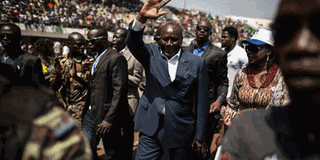Central African Republic goes for referendum on Sunday

Karim Meckassoua (centre), an independent candidate supported by the National Unity Party, arrives at the stadium in Bangui on December 5, 2015. Mr Meckassoua ia among thirty candidates who are vying for the presidency in the volatile Central African Republic. PHOTO | MARCO LONGARI |
What you need to know:
- Central African Republic braces for a referendum on Sunday aimed at ending its bloody sectarian strife.
- The December 13 vote on a new constitution is a test run for presidential and parliamentary polls scheduled two weeks later.
- Widespread chaos has hampered organisation of the ballot by CAR’s interim authorities.
BANGUI, CAR
Two weeks after Pope Francis appealed to Muslims and Christians in the Central African Republic to live as “brothers and sisters”, the volatile nation braces for a referendum on Sunday aimed at ending its bloody sectarian strife.
After more than two years of fighting that forced one out of 10 people to flee the country, the December 13 vote on a new constitution is seen as a test run for presidential and parliamentary polls scheduled two weeks later.
But despite the presence of 11,000 UN and French peacekeepers, part of the impoverished country remains out of bounds, either under the control of rebel chieftains or bandits.
WIDESPREAD CHAOS
The widespread chaos has hampered organisation of the ballot by CAR’s interim authorities, with few election posters visible on the streets just 48 hours beforehand.
More significantly, only 15,000 copies of the new constitution have been printed, meaning few voters are fully aware of its contents.
Yet almost two million Central Africans have registered to vote in a population of 4.8 million — highlighting hopes the election will be the first step in a return to peace and normalcy.
“I still don’t have my voter card, so I don’t know if I’ll be able to vote simply by showing my ID card or a record that I registered,” said a schoolteacher who gave her name only as Natacha and has been living in a refugee camp in the last weeks.
And of the 460,000 people living in camps across CAR’s borders — many of them Muslims — only 26 percent have been able to register.
In the volatile capital Bangui, which has been far quieter since the pope’s bold 24-hour visit, peacekeepers are on edge. “Here things can blow up very quickly,” said a security source who declined to be identified.
SET UP TO BATTLE
“The conditions are not right for an election,” said Maxime Mokom, a leader of the Christian militia known as the “anti-balaka” set up to battle the mainly Muslim Seleka rebel force.
“Christians and Muslims are brothers and sisters,” Pope Francis told Central Africans in a message of peace.
The former French colony plunged into its worst crisis since independence after longtime Christian leader Francois Bozize was ousted by rebels from the Seleka force in March 2013, triggering a wave of violence with “anti-balaka” militias.
“Together, we must say no to hatred, to revenge and to violence, particularly that violence which is perpetrated in the name of a religion or of God himself,” the pope said.
(READ: Central Africa’s ex-Seleka leader to prevent elections in his turf)
But senior rebel figure Nourredine Adam has threatened to block elections in areas under his control.
His Patriotic Front for the Renaissance of Central Africa (FPRC), a splinter faction of the former Seleka rebel group that staged a coup in 2013, is staging an armed revolt in northern Kaga Bandoro.
“The elections might be difficult in Kaga Bandoro and one or two other places,” said an EU diplomat, who added however that the stakes would be highest in the country’s most densely populated regions in Bangui and the west.
The international community, which has been pouring aid into the country for over two years, is keen for the referendum as well as the follow-up elections to take place.
“These are make-or-break elections,” said the International Crisis Group’s Thierry Vircoulon.





